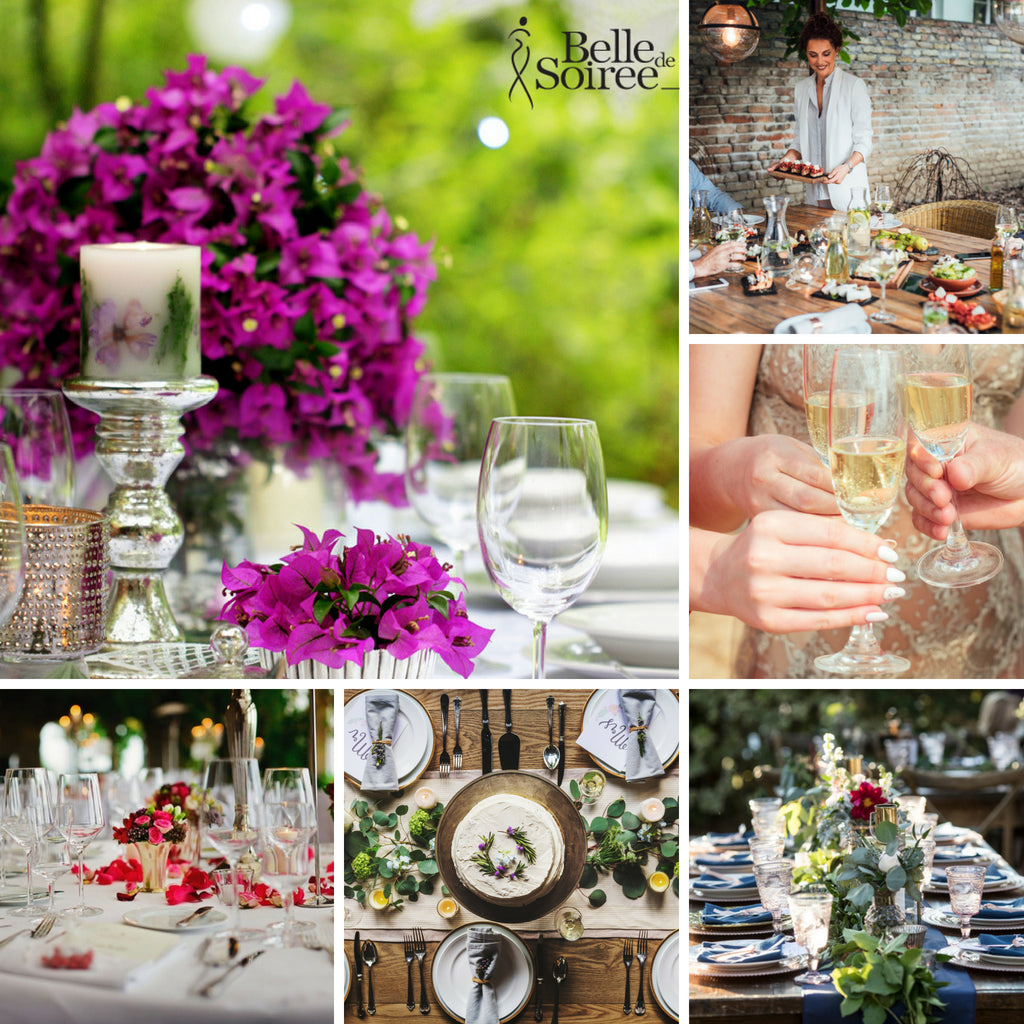🔥25% OFF- CODE VAL25 🔥
🔥25% OFF- CODE VAL25 🔥

British and French Table Manners: Avoid Etiquette "Faux-Pas" !
October 25, 2019 5 min read
Have you been invited to a dinner party by French or British hosts? Although most rules of etiquette are similar (and obvious), some cultural differences have not crossed the Channel and might lead to a social mishap. We have detailed below the most important differences to help you with French table manners and maintain the “entente cordiale”.
Guide to British and French Table Manners
First, a basic “social survival kit” to remind us of the common good manners that should be shared by all.
- Never arrive empty-handed, a bottle of wine, champagne, chocolates, a candle or flowers (though prefer ones already in a vase or plants to save your host the stress of finding a suitable vase last minute).
- If you are hosting, carefully prepare a seating plan. Alternate women and men, place the most important guest next to you and your partner, and split couples (except just married or engaged couples). Seek advice for very formal dinners with the Royal family or diplomats. And of course, take affinities into account.
- It might seem a bit old-fashioned, but you are not supposed to sit until the hostess does and to stand up before she does at the end of the dinner.
- After seating, unfold and place your napkin on your knees (of course not around your neck or in your collar!).
- Serve ladies first, starting with the lady sitting on the right-hand side of the host, then men, always finishing with the host. Men will always refill the ladies' glasses (a lady shall never pour herself wine).
- Don’t rush immediately to your bread or food, and wait until the hostess starts to eat first.
- It might sound like obvious advice, but do not eat with your hands (chicken leg, prawns, even peach...), say you don’t like the food, empty your glass in one gulp, pick your teeth, lick your knife or your fork …
- Absolutely no eating with your mouth wide open or making a lot of noise, slurping, speaking or drinking while your mouth is full, “gesticulate” with cutlery in your hands,
- Avoid dropping your cutlery directly on the tablecloth when you make a pause, but place them crossed on your plate or on the knife holder if there is one.
- When you drink, delicately wipe your lips before and after each sip (without leaving bold food or lipstick marks on the napkin).
- It is impolite to reach over someone else’s plate for an item such as seasoning or water; ask for the item to be passed to you.
- When you have finished your dish, place your cutlery in parallel on your plate, fork tines down towards the centre.
- Fold and leave your napkin on the table near your plate as you get up to leave the table.
- Always comment positively on the dinner, food, decoration, wine…and send a thank you note or message the day after dinner.
French Table Manners vs British Table Manners
Now let’s discuss French do and British don’t (and vice versa).
- British people love writing and will, most of the time, send you a written invitation, whereas the French are more likely to call.
- French hosts will never ask their guests to bring food (even good friends!), which is a more British habit. They take pride in doing the work and performing the show.
- In the UK, people really care about special diets and allergies, and will always ask their guests if they have food restrictions to avoid uncomfortable situations. French won’t really bother, and you are expected to eat what has been served to you.
- Whereas in British etiquette, punctuality is a golden rule (you must arrive at the exact time mentioned on the invitation), the French will expect you to respect the “quart d’heure de politesse” (being 15 minutes late to be polite) to allow your hosts to finish preparations.
- We all know how much the British like to dress and how “daring” they can be in terms of fashion, showing off gorgeous dresses or dinner jackets. French will be more traditional.
- When in the UK calling your boss by his first name or giving someone a nickname is quite common, calling a French person who is not a very close friend "my love" "sweetheart" or "my dear" will make him uncomfortable. The French will also make a clear distinction between “tutoiement” and "vouvoiement", depending on their relation to the other person. This can be more “tricky” for the British.
- What do I do with my hands? Here again British and the French have a different code. In France, you absolutely have to put your hands and forearms (never the elbows, though!) on the table (you never know what could happen under the table!). Britons usually sit with one hand on the table and the other on their knees (more comfortable). The French (and Italian art of “speaking with your hands” is considered so “un-English”.
- When all glasses will be full, British guests will rarely miss the Loyal Toast to the Sovereign, Queen, for instance, whereas France doesn’t have a Queen any longer and is more likely to offer a toast to another “queen”: The hostess (less likely to the French President!)
- Saying "bon appétit" to French guests is considered very “low class”
- Smoking habits still (unfortunately) differ widely. It is totally unacceptable and rude to smoke during dinner, between courses, in the UK (even more indoors), French still love “social smoking.”
- The French find it very vulgar to spread your foie gras (a typically French controversial delicacy), pâté or cheese on a big piece of bread as if you were making a sandwich, take a generous slice, set it on the bread (with your knife).
- Bear in mind that the French (bad) habit of 'cleaning up' sauce on the plate with bread is considered extremely rude in the UK, even if you hold a piece of bread with your hand.
- The French would consider it an insult if you ask for more food (even if portions are tiny) unless the hosts offer more (and only after you refused it the first time). It is very polite to leave a bit of food and not clear your plate.
- If you are still very hungry when the cheese arrives (before the dessert for the French, or kept until last for the British), remember you are only allowed one serving (make “provisions”!). Also, learn the proper French way to cut the cheese correctly.
- In France, bread is “sacred”, don’t cut it with your knife, or bite directly into it, you must tear little pieces with your hand (just like Jesus did!), especially don’t “play” with it making little balls! Unlike the English do not put their bread on their plate, always leave it on the table (or in the dedicated “bread plate” when there is one).
- Cutting the lettuce with a knife and fork is a faux pas in France (it will suggest it was not prepared correctly), just fold the leaves and put them in your mouth.
- Except maybe with French fries, the French will never dare to bring Ketchup to the table; it is always best not to ask for it.
If you are planning a dinner party, feature some French-inspired party decor.
Rules of etiquette are usually communicated from generation to generation and are seen as a sign of respect. Although a lot has changed since our great-grandparents’ time, and we must adapt to new customs and the influence of foreign culture crossing the borders, French table manners will forever help us a lot in our social life. So it is sometimes good to remind them.
Leave a comment
Comments will be approved before showing up.

